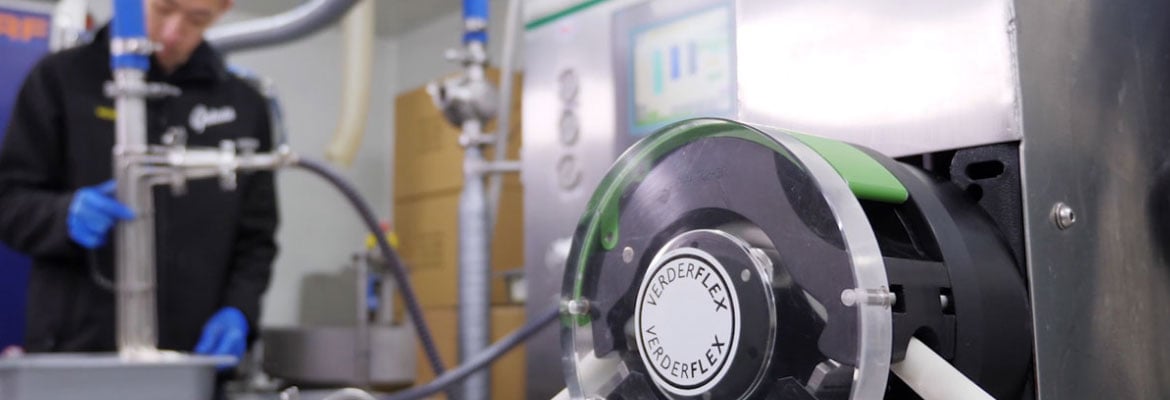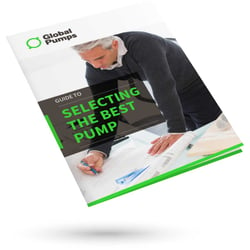Pumps in the food and beverage industry must comply with strict standards to ensure the integrity of the product being pumped. To ensure you select the ideal food-grade pump, it is critical you consider the following: flow rate, product characteristics, construction materials and any approval requirements.

Our Global Pumps' team sit down and share their knowledge on these considerations:
1. Flow rate
Flow rate is defined as the volume of liquid that travels through the pump in a given time, commonly litres per minute or per hour. We discuss calculating your flow rate in this recent blog.
Selecting the correct pump involves matching the flow and pressure rating of a pump with the flow rate and pressure required for your process. Therefore, understanding your site's requirements are critical. If your process demands a higher flow rate, Packo hygienic centrifugal pumps provide an efficient solution. For lower flow requirements, Packo lobe pumps ensure precise and gentle handling.
2. Characteristics of the product
Viscosity
Viscosity is how thick or runny your product is. This characteristic must be considered when selecting your pump and determining the process system's friction loss. We describe the importance of viscosity in another blog by our team.
If your product is highly viscous, Global Pumps recommends a positive displacement pumps, such as the Packo lobe pumps. These are specifically designed to handle viscous fluids, operate at low speeds and transfer lower amounts of shear energy to the fluid in comparison to other forms of pump technology.
Alternatively, if your product has low viscous characteristics, centrifugal pumps are suitable. Centrifugal pumps generate high liquid shear, and therefore should only be used with low viscous liquids.
Abrasion
An abrasive liquid is one that can cause increased wear to your pump either by eroding surfaces through physical force. The viscosity of this abrasive fluid can play a role in determining the degree of the wear on the pump. Therefore, it's important you consider both the abrasive and viscous characteristics of your fluid in tandem.
Although abrasive fluids are not as common in food and beverage applications, they should still be considered. Packo lobe pumps and peristaltic hose pumps are ideal for handling abrasive fluids, as they minimise internal wear while maintaining efficiency.
Be sure to assess the nature of your product and discuss the possibility of wear when selecting your pump.
Material shear
Shear sensitive products are those materials that alter their properties when 'worked'. These are also referred to as non-Newtonian liquids, and change in viscosity depending on the shear rate applied. An example of these liquids would be tomato sauce or mayonnaise. Newtonian liquids are the opposite and hold their viscosity regardless of the shear rate.
If you are pumping these shear sensitive products, it is critical that you select a pump that offers gentle pumping action. Diaphragm, lobe and peristaltic hose pumps are a popular choice for shear-sensitive products. Centrifugal pumps are not suitable and will shear the product, ruining its integrity.
You can learn more about pumping shear sensitive products in our video below.
3. Construction materials
One of the most critical pump characteristics to consider is the material of the pump. If the materials are not compatible with the ingredients being pumped, you may experience pump failure, downtime and/or expensive repairs. Sanitary pumps are typically constructed from stainless steel, offering operators safe and hygienic transfer of liquids.
An important factor that is often overlooked are the chemicals being used for cleaning. Besides the product itself, the pump's construction and elastomers need to be compatible with the facility's cleaning solutions and clean-in-place (CIP) requirements. Faults can occur when the pump elastomer or seal, and pump itself, is compatible with the food ingredient but cannot cope with the caustics used to clean the pumping system. If the facility does not use caustics and instead uses steam-in-place cleaning methods, then the pump must be able to handle the extreme temperatures that run through. We discuss pumps appropriate for CIP in a recent blog.
The pump manufacturer can advise of suitability to your food or beverage application.
4. Approval requirements
Most food and beverage equipment suppliers are familiar with national and international requirements and can advise on best practice to ensure your production is safe and effective.
If you are unsure, it is always best to speak to the pump manufacturer. They will be able to provide certification outlining compliance with industry standards or expectations.
Are you ready to chat to a Global Pumps' team member? Give us a call to discuss your food and beverage application. Our team have over 47 years' experience working with leading food and beverage producers, offering effective, efficient and quality pumping systems.
Browse our success with other customers who needed hygienic pumps for their food and beverage applications here.

